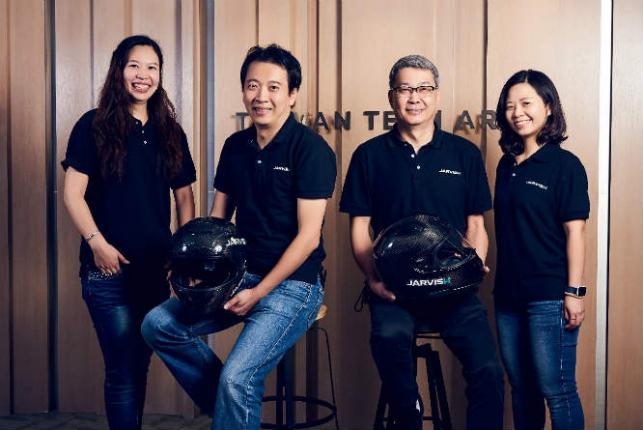
LAS VEGAS, Jan. 8, 2020 /PRNewswire/ — Jarvish and other notable homegrown startups led by Taiwan Tech Arena (TTA) are now showcasing their innovative solutions at CES 2020.
Smartphones have been around for more than 10 years. People nowadays tend to find smart mobile devices that suit their needs and are easy to use based on different usage scenarios. Recognizing this trend – as well as the development of 5G technology which will perfect connected vehicles – startup company Jarvish, whose core members mainly consist of former employees from Hon Hai, has spared no efforts to develop top-notch motorcycle gear for connected vehicles. By utilizing its strong technology integration capabilities, Jarvish has brought the world a smart helmet featuring a stylish design and practical functions.
Jarvish’s smart helmet comes with a built-in 2K HD action camera, a sensor that detects whether the helmet is being worn, OGS surrounding HD sound system, smart voice control system, wireless charging module, and HUD (Head-Up Display) that allows you to browse information while riding. “Unlike other mobile devices, smart helmets need to provide not only high performance and advanced technology but also security. Therefore, we have studied security regulations in different countries and set our eyes on markets with high-security requirements,” said Jeremy Lu, founder of Jarvish. To meet the security requirements, the materials, the placement of the microphone, camera, HUD, battery, and Bluetooth module, as well as the wiring of the helmet must be thoroughly planned. For example, since the battery is placed near the rider’s head, the lithium battery commonly used in commercial products must be replaced with the explosion-proof ceramic battery intended for military use. The ceramic battery can run for up to five hours. Also, the HUD consumes power constantly; therefore, the battery size and the thickness and weight of the EPS insulation panel must be designed properly. These details all demonstrate Jarvish’s ability to integrate technologies from different industries.
When the helmet is connected to the network via a smartphone, the rider can use leading brands’ voice assistants such as Siri, Google Assistant, or Alexa to make phone calls, activate navigation services, listen to music, or broadcast a live video on Facebook without using their hands. The rider can also customize voice commands via Alexa Skills Kit if needed.
Jeremy Lu added that they would try to provide support for all mainstream voice assistants in the helmet. That being said, there are less than 30 voice commands used when riding a motorcycle. Therefore, Jarvish has developed its own voice assistant specially designed for riding scenarios. The company has also worked with the world’s largest mapping software company. By using its own app, Jarvish’ smart helmet can be updated with all kinds of voice information including riding speed, speed camera warnings, weather forecasts, nearby gas stations, nearby Gogoro charging stations, and navigation data.
To protect the rider’s safety, Jarvish’ helmet is not only IPX6 water-resistant but also compliant with CNS, DOT, and ECE standards. When the sensor attached to the helmet detects a crash while it is being worn, Jarvish’s voice assistant will ask the rider if he/she needs an ambulance. The rider can also cancel emergency aid via voice commands.
“Once Jarvish’s smart helmets are widely adopted, the big data they collect can also be used to improve traffic conditions and construct smart cities,” said Jeremy Lu confidently.